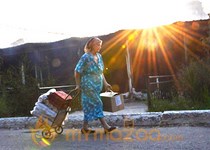Hundreds of Russian trucks carrying aid intended for rebel-held eastern Ukraine remained parked Wednesday in the southern city of Voronezh as doubts grew over the convoy's final route.
The white-tarped vehicles lay idle at a military base in Voronezh after driving there from the outskirts of Moscow the day before.
Ukraine and Russia have tentatively agreed that the aid will be delivered to a government-controlled crossing in Ukraine's Kharkiv province, which hasn't been touched by the months of fighting that have wracked neighboring regions. Still, it remained unclear Wednesday whether the convoy would take that route.
Amid the tensions, Russian President Vladimir Putin traveled to Crimea, a Black Sea peninsula that Russia seized from Ukraine in March, where he was to chair a session of his Security Council later Wednesday. A meeting with Putin's entire Cabinet and most Russian lawmakers was scheduled for Thursday.
A key sticking point for Ukraine is that all incoming humanitarian aid must be vetted by the International Red Cross. Officials in Kiev said Tuesday the aid cargo could be unloaded at the border and loaded onto vehicles leased by the Red Cross.
But Russian Foreign Minister Sergey Lavrov said while the unloading idea had come under discussion, it was rejected for cost reasons.
The estimated 2,000 metric tons of aid, which reportedly includes goods ranging from baby food to portable generators, is intended for civilians in the Luhansk region, the scene of some of the fiercest fighting between government troops and pro-Russian separatists. The regional capital of Luhansk has had no electricity for 11 days and only the most essential goods are available, city authorities said.
Intense fighting was still taking place in the main rebel-held city of Donetsk. At least 12 militiamen fighting alongside government troops were killed in an ambush outside the besieged city, a spokesman for their radical nationalist movement said Wednesday. Inside the city, at least three people were killed overnight Tuesday as the government intensified its shelling.
Artem Skoropatsky said the Right Sector volunteer fighters were shot dead while traveling on a bus and many others on the bus were wounded and taken captive. He did not know how many.
"There is a suspicion that the wounded will be treated very harshly and could be shot," he said.
Right Sector played a marginal if highly visible role in the protests that culminated in the overthrow of President Viktor Yanukovych in February. Its far-right nationalist affiliations have made it a target of lurid reporting in Russia state media, which has sought to cast the post-Yanukovych government as extremists.
Andriy Lysenko, a spokesman for Ukraine's National Security and Defense Council, said Wednesday that 11 servicemen were killed in the previous day's fighting, but he could not immediately say whether that figure included the Right Sector militiamen.
Government troops have laid siege to Donetsk and nearby rebel holdings in their push to quash the pro-Russian insurgency. They have largely refrained from street-to-street fighting, favoring often inaccurate rocket fire.
Residents said the intermittent artillery barrage lasted around two hours. City authorities said 10 residential buildings and the wing of a hospital were struck.
Associated Press reporters saw two bodies lying in a street Wednesday morning in Donetsk's southwestern Petrovsky district. The city government reported three deaths.
The shelling has damaged power plants and gas pipelines, leaving left large parts of the city without electricity or gas.
The fighting in eastern Ukraine began in April, a month after Putin annexed Crimea.







